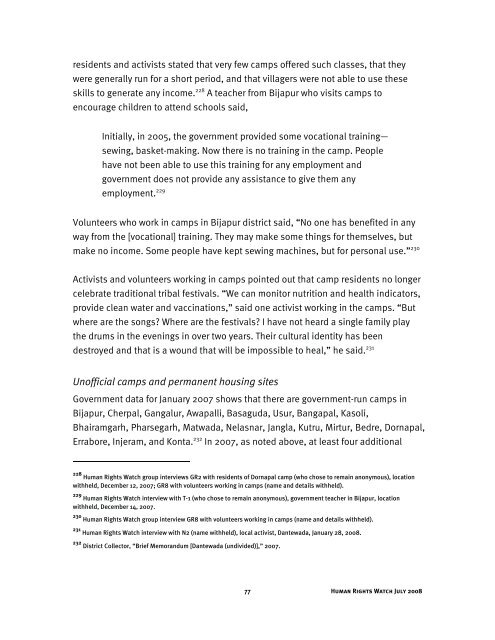âBeing Neutral is Our Biggest Crimeâ - Global Coalition to Protect ...
âBeing Neutral is Our Biggest Crimeâ - Global Coalition to Protect ...
âBeing Neutral is Our Biggest Crimeâ - Global Coalition to Protect ...
You also want an ePaper? Increase the reach of your titles
YUMPU automatically turns print PDFs into web optimized ePapers that Google loves.
esidents and activ<strong>is</strong>ts stated that very few camps offered such classes, that they<br />
were generally run for a short period, and that villagers were not able <strong>to</strong> use these<br />
skills <strong>to</strong> generate any income. 228 A teacher from Bijapur who v<strong>is</strong>its camps <strong>to</strong><br />
encourage children <strong>to</strong> attend schools said,<br />
Initially, in 2005, the government provided some vocational training—<br />
sewing, basket-making. Now there <strong>is</strong> no training in the camp. People<br />
have not been able <strong>to</strong> use th<strong>is</strong> training for any employment and<br />
government does not provide any ass<strong>is</strong>tance <strong>to</strong> give them any<br />
employment. 229<br />
Volunteers who work in camps in Bijapur d<strong>is</strong>trict said, “No one has benefited in any<br />
way from the [vocational] training. They may make some things for themselves, but<br />
make no income. Some people have kept sewing machines, but for personal use.” 230<br />
Activ<strong>is</strong>ts and volunteers working in camps pointed out that camp residents no longer<br />
celebrate traditional tribal festivals. “We can moni<strong>to</strong>r nutrition and health indica<strong>to</strong>rs,<br />
provide clean water and vaccinations,” said one activ<strong>is</strong>t working in the camps. “But<br />
where are the songs? Where are the festivals? I have not heard a single family play<br />
the drums in the evenings in over two years. Their cultural identity has been<br />
destroyed and that <strong>is</strong> a wound that will be impossible <strong>to</strong> heal,” he said. 231<br />
Unofficial camps and permanent housing sites<br />
Government data for January 2007 shows that there are government-run camps in<br />
Bijapur, Cherpal, Gangalur, Awapalli, Basaguda, Usur, Bangapal, Kasoli,<br />
Bhairamgarh, Pharsegarh, Matwada, Nelasnar, Jangla, Kutru, Mirtur, Bedre, Dornapal,<br />
Errabore, Injeram, and Konta. 232 In 2007, as noted above, at least four additional<br />
228 Human Rights Watch group interviews GR2 with residents of Dornapal camp (who chose <strong>to</strong> remain anonymous), location<br />
withheld, December 12, 2007; GR8 with volunteers working in camps (name and details withheld).<br />
229 Human Rights Watch interview with T-1 (who chose <strong>to</strong> remain anonymous), government teacher in Bijapur, location<br />
withheld, December 14, 2007.<br />
230 Human Rights Watch group interview GR8 with volunteers working in camps (name and details withheld).<br />
231 Human Rights Watch interview with N2 (name withheld), local activ<strong>is</strong>t, Dantewada, January 28, 2008.<br />
232 D<strong>is</strong>trict Collec<strong>to</strong>r, “Brief Memorandum [Dantewada (undivided)],” 2007.<br />
77<br />
Human Rights Watch July 2008
















